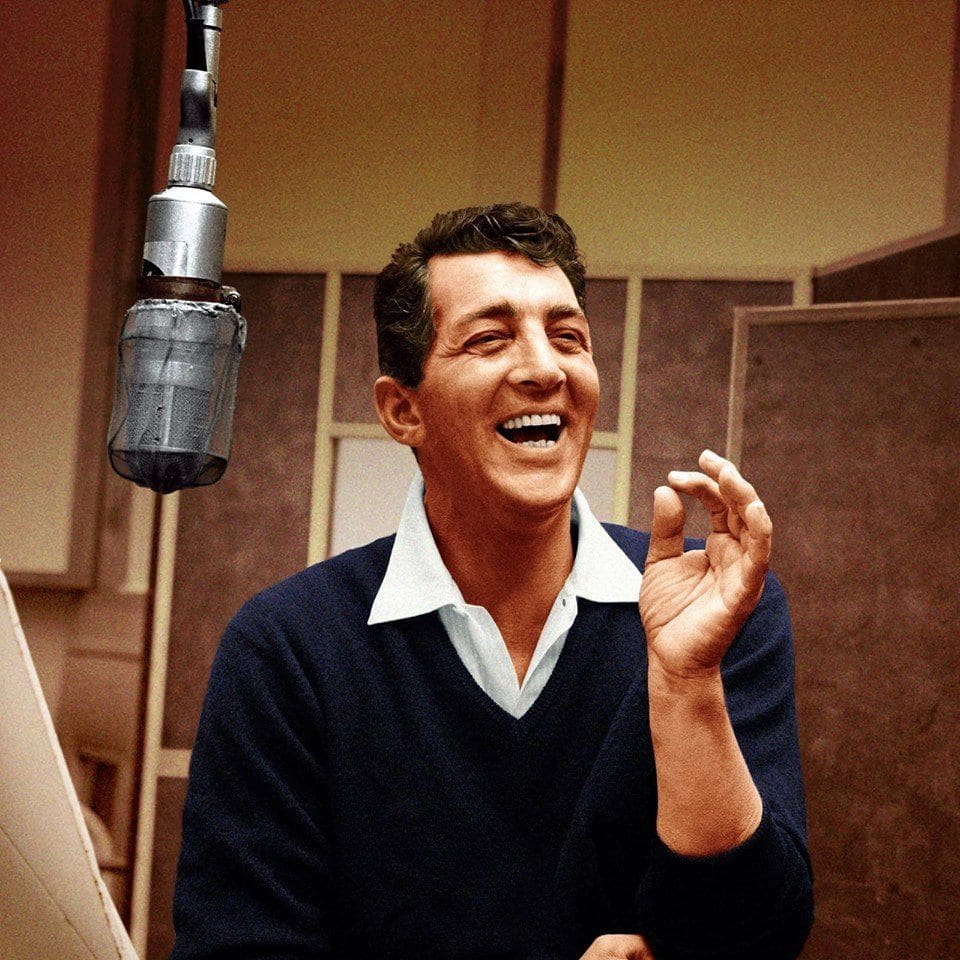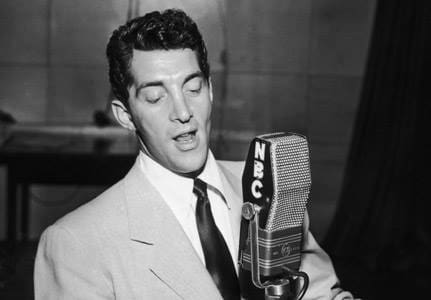DECEMBER 25, 1995 – Singer/actor/comic/film producer DEAN MARTIN (b. June 7, 1917 in Steubenville, Ohio as Dino Paul Crocetti) died of acute respiratory failure resulting from emphysema at his Beverly Hills home at age 78 after having been diagnosed with lung cancer at Cedars Sinai Medical Center in September 1993. The lights of the Las Vegas Strip were dimmed in his honor. Martin is interred at the Westwood Village Memorial Park Cemetery in Los Angeles. His crypt features the epitaph “Everybody Loves Somebody Sometime”, the name of his signature song.
One of the most popular and enduring American entertainers of the mid-20th century, Martin was nicknamed the “King of Cool” for his seemingly effortless charisma and self-assurance. He and Jerry Lewis were partners in the immensely popular comedy team “Martin and Lewis”. He was a member of the “Rat Pack” and a star in concert stage/nightclubs, recordings, motion pictures, and television. He was the host of the television variety program “The Dean Martin Show” (1965–1974) and “The Dean Martin Celebrity Roast” (1974–1985).
Martin’s relaxed, warbling crooning voice earned him dozens of hit singles including his signature songs “Memories Are Made of This”, “That’s Amore”, “Everybody Loves Somebody”, “You’re Nobody till Somebody Loves You”, “Sway”, “Volare”, and “Ain’t That a Kick in the Head?”.
After dropping out of Steubenville High School in the 10h grade, Martin worked odd jobs. He delivered bootleg liquor, served as a speakeasy croupier and blackjack dealer, worked in a steel mill and briefly ruled the ring as boxing phenom Kid Crochet. Winning his share of bouts earned him little apart from a broken nose, but Dino’s speakeasy experience put him in contact with club owners, resulting in his first singing gigs.
Martin began his show business career at age 17, singing in Ohio nightclubs near his hometown. During a stint with the Ernie McKay band, he was noticed by Cleveland bandleader Sammy Watkins, who hired him as the band’s featured vocalist. He began touring with Watkins in 1938, and in 1940, changed his name to Dean Martin, styling himself after the top male vocalist of the time, Bing Crosby, and met Frank Sinatra in New York.
n September 1943, Martin signed an exclusive contract with MCA to sing at the Riobamba Room in New York, and in 1944, he was given his own 15-minute radio program entitled Songs by Dean Martin, which was broadcast from New York City. In 1946, he signed a contract and recorded four songs with Diamond Records including his first single, “Which Way Did My Heart Go?”
During a club engagement in 1946, Martin met Jerry Lewis and the two began joking around with each other during their respective acts. The two shared a bill at the 500 Club in Atlantic City, but the night they combined their acts into a combo of manic comedy and debonair music saw the birth of a phenomenon. They were the hottest ticket around and parlayed their onstage success into a string of hit movies and television appearances with Martin playing the straight man to Lewis’s clown. NBC broadcast a regular 30-minute radio program featuring the pair in 1949, and they made their television debut in the “Colgate Comedy Hour” in 1950. The immensely popular Martin and Lewis team made 16 films together between 1949 and 1956.

During Martin and Lewis’ decade-long partnership, Dean had such hits as “Memories Are Made of This,” “That’s Amore,” “Powder Your Face With Sunshine” and “You Belong to Me” among others, all for the Capitol label. Yet when their partnership dissolved, showbiz pundits predicted Lewis’ star would continue to rise and Martin’s would fizzle.
The singer confounded the skeptics. As a solo act he was wowing crowds in Vegas, impressing critics and audiences in a series of dramatic film roles, scoring on TV with Dean Martin Show specials for NBC, and hitting the charts again with “Return to Me” and “Volare.”
Not soon after, Martin’s affiliation with Frank Sinatra, Sammy Davis, Jr. and the rest of the fabled Rat Pack supplanted his earlier rep. He fueled his image as a boozing playboy in onstage antics with his pals and ring-a-ding ensemble films like “Ocean’s Eleven” yet Martin later claimed his cocktail-swilling persona was largely a pose.
Though he left Capitol to sign with Sinatra’s fledgling Reprise label, Martin capped his tenure there with a bang, releasing two classic singles, “Ain’t That a Kick in the Head” and “You’re Nobody ‘Til Somebody Loves You,” showcasing him at the height of his powers.
Even at the height of Beatlemania with the group topping the charts, Martin reasserted himself with typical aplomb knocking the Fab Four from their perch with the buttery anthem “Everybody Loves Somebody.” Several other hits, including “The Door Is Still Open to My Heart,” “I Will,” “Houston” and “Send Me the Pillow You Dream On” followed during his years at Reprise.
Though he continued to perform, Martin’s visibility was greatest in films and on TV, where he nursed his lush-in-a-tux image with the long-running “Dean Martin Variety Show” and the hugely successful “Dean Martin’s Celebrity Roast”.

Martin suffered a tragic loss when his son, Dino Jr., was killed in a plane crash during a military training exercise in 1987. He retired from show business after a 1988-89 concert tour with fellow Rat Packers Sammy Davis Jr. and Frank Sinatra, which ended for Martin after he became ill and was replaced by Liza Minelli for the remainder of the tour.
His effortless vocalizing has become a modern shorthand for cool, as evidenced by the use of his songs in films, television, and ad campaigns. Dino: “The Essential Dean Martin”, a recent collection of both the Capitol and Reprise eras, sold more briskly than any previous Martin recording, going gold within months and platinum within a year.
Biographer Nick Tosches (“Dino: Living High in the Dirty Business of Dreams”) described Martin as a classic menefreghista, Italian for “one who does not give a f—.” The term, in Dean Martin’s case, conveys not indifference but a refusal to be beaten down by the world and a determination to greet life with an easy smile, a graceful melody and an aura of unflappable cool.
Martin appeared in a total of 51 films in his lifetime, including “Some Came Running” (1958) with Shirley MacLaine and Frank Sinatra, “Bells Are Ringing” (1960) with Judy Holliday, “Rio Bravo” (1959) with John Wayne, “Toys in the Attic” (1963), “Airport” (1970), “Cannonball Run” (1981) and “Cannonball Run II” (1984).
SOURCES
http://www.deanmartin.com/
http://www.imdb.com/name/nm0001509/bio
http://www.deanmartinfancenter.com/
http://www.deanmartinsteubenville.com/
http://www.biography.com/people/dean-martin-9542166
http://www.allmusic.com/artist/dean-martin-mn0000813392/biography
https://en.wikipedia.org/wiki/Dean_Martin
https://www.facebook.com/DeanMartin
